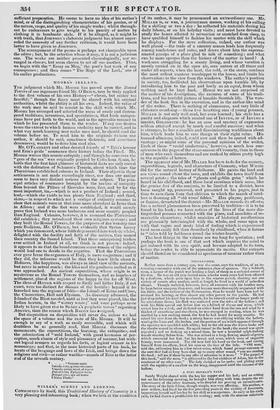MOORE'S IRELAND.
THE judgment which Mr. MOORE has passed upon the Round Towers of our ingenious friend Mr. O'BRIEN, may be truly applied to the first volume of his own History—" clever, but rather too fanciful;" though the fancy must be shared with his original authorities, whilst the ability is all his own. Indeed, the value of the work may be said to consist in the skill with which Mr. MOORE has arranged and selected the mass of crude and distem- pered traditions, inventions, and speculations, that Irish antiqua- rians have put forth to the world, and in the agreeable manner in which he has presented them to the reader. If any one desires to see the extent to which human credulity may be carried, and in what way much learning may make men mad, he should read the volume before us. To send him to the originals (whom our author, it should he said, sometimes distrusts, and sometimes denounces), would be to drive him mad also.
Mr. O'FLAHERTY and other devoted friends of " Erin's honour and Erin's pride " commence their history before the Flood. Mr. MOORE waives this remote antiquity ; and though he conceives the "gem of the sea" was originally peopled by Celts from Spain, he holds that the first faint glimmer of historical flues are only coeval with the dedication of Solomon's Temple, about which time the Phoenicians established colonies in Ireland. Their object in these settlements is not made exceedingly clear, nor does our author seem to have very distinct notions upon the subject. The prin- cipal articles of commerce brought by the traders of antiquity from beyond the Pillars of Hercules were, first, and by far the most important, tin,—which is not a product of Ireland ; second, lead,—which she yields in less plenty than England ; and third, skins,—in respect to which not a vestige of authority remains to show that animals were at that time more abundant in Ierne than in Albion; and if the fact were established, it would merely prove that Ireland was more barbarous and more scantily peopled than England. Colonies, however, it is assumed the Phoenicians did establish ; they introduced their own religious systems ; and they built the Round Towers, for the purposes of the worship (not pure Budhism, Mr. O'BRIEN, but evidently that Syrian heresy which you denounced, where faith degenerated into works); whilst, delighted with the docility and faith of the natives, they named their country the Sacred Island. That these enterprising traders ever settled in Ireland at all, we think is not proven : indeed, it appears to us that the broad common souse reason of the subject would lead one to decide in the negative. That the Phoenicians ever gave Tome the cognomen of Holy, is mere conjecture ; and if they did, the inference would be that they knew little about it. Holiness, like happiness, was always in ideal view of the ancients, but never in actual reach ; the bliss and the goodness melted as it was approached. An ancient superstition, whose origin is as mysterious as the Round Towers themselves, and as hopeless of settlement, placed the regions of the happy in the far off West. The ideas of HOMER with respect to Sicily and hither Italy, if not exact, were too distinct for dreams of the beatific: beyond it he launched into the regions of fable—the Islands of Eolus and Circe, the Cimmerians, Hell and Elysium. As discovery advanced, the Islands of the Blest receded, until at last they were placed, like the Indian heaven, in the "watery waste ;" and were perhaps more likely to have given rise to SENECA'S prophetic verses* regarding America, than the reason which BACON has assigned. But disquisition on disquisition will never do, unless we had the space of a volume and the taste of Mr. MOORE. It will be enough to say of a work so easily accessible, and which will doubtless be so generally read, that MOORE discusses the monuments, the superstitions, the learning, the antiquities, and the colonization of "ould Ireland," with great keenness of per- ception, much charm of style and pleasantry of manner, but with- out logical acumen as regards his facts, or logical science in his reasonings; and that, in the more historical parts of his book, he treats of the language and laws of the Irish, and brings down the religious and civil—or rather warlike—annals of Erin to the latter end of the seventh century.
• . . . . Venient annis Stecula serisoimibus Oceanus
Vincula rerun, laxet, et ingois Prtiettt Who, Tiphysepie maws Detegat orbes. nec sit terris Ultima Thule."


























 Previous page
Previous page